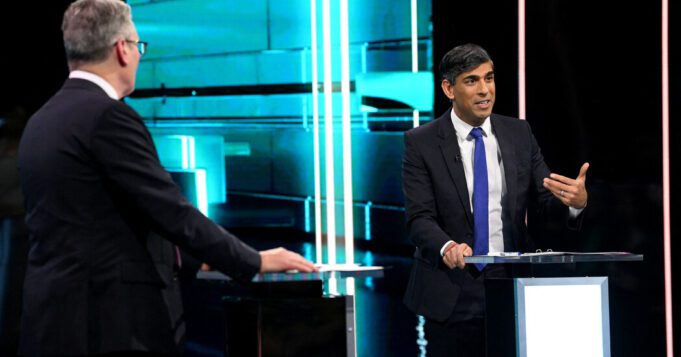The two candidates to become Britain's next prime minister clashed fiercely on Tuesday over tax, immigration and health policy in a televised debate that at times degenerated into acrimonious exchanges as the two political rivals argued over each other.
The clash comes a month before a crucial election that will determine whether the opposition Labour Party can use its lead in the opinion polls to end 14 years of turmoil The Conservative Party has had five prime ministers during its time in government.
At the start of the debate, British Prime Minister Rishi Sunak repeatedly claimed that his opponent, Labour leader Keir Starmer, would raise taxes on Britons by £2,000 a year if he won the election. Starmer eventually responded: “That's nonsense.”
Labour said the figure was based on false assumptions, with senior party MP Jonathan Ashworth claiming in an interview with Sky News after the debate that Mr Sunak LyingBut Starmer’s failure to definitively deny the claim early in the broadcast set the tone for the rest of the conversation: a steady but defensive performance by the opposition leader against an energetic and sometimes ruthless opponent.
A quick poll of our audience Sunak declared a narrow winnerAlthough Mr Starmer is seen as More likable And more trustworthy. While the debate is unlikely to sway large numbers of votes, Sunak’s performance may have calmed some nerves in an anxious party.
With the Conservatives trailing in the polls for more than 18 months, the broadcast was Sunak’s chance to reignite his stalled campaign. The beginning of a slip of the tongueThe prime minister's prospects appeared to get worse on Monday when right-wing rebel Nigel Farage spoke out Surprising decision to run for election.
For Starmer, the main goal is to avoid losing momentum ahead of the July 4 general election, which polls suggest he is on track to win, perhaps comfortably.
There was no landslide in Tuesday's hour-long debate, filmed before a studio audience in Salford, near Manchester, the first of two televised contests between Sunak and Starmer.
Mr Sunak, animated and at times aggressive, pushed his point more aggressively, accused Labour of having no plan to form government and frequently interrupted Mr Starmer despite pleas from moderator Julie Etchingham for him to remain calm.
But Sunak struggled to defend the Conservatives' 14-year record in power, while Starmer mocked him for failing to shorten waiting lists for more than 7 million treatments in the health system as promised.
“It was 7.2 million, now it's 7.5 million. He says the number is coming down, this is a guy who says he's good at maths,” Mr Starmer said of the prime minister.
“They are at a higher level now than they were before,” Sunak responded to laughter from the audience.
In a familiar recriminations, Starmer said the government had “lost control of the economy”, adding that “ordinary people are paying the price”. Sunak argued his plans would help restore economic growth and said Labour would jeopardise that progress.
Television general election debates are a relatively new phenomenon in Britain, with the first one taking place in 2010. This time, Mr Sunak is tasked with making an impact, with Lee Cain, who worked in Downing Street for one of Mr Sunak’s predecessors, Boris Johnson, describing the debate as “one of the last chances for a prime minister to change the political fortunes of his party”.
Earlier on Tuesday, Mr Farage, who took over as leader of Reform UK, a small far-right party committed to reducing immigration, addressed hundreds of people in Clacton, one of the areas where he plans to contest the general election.
Farage used his reputation as a political troublemaker to call on voters to send him to Parliament “as a nuisance”. However, not all onlookers took kindly to Farage, with one protester throwing a large milkshake at him. A woman was later arrested.
Farage, a leading Brexit supporter, has tried and failed seven times to become an MP for the British Parliament, but analysts believe he has a good chance in Clacton, an area that strongly supports Brexit and was represented by an MP from the UK Independence Party, which Farage led in support of Brexit.
Nationally, Reform UK is unlikely to win more than a few seats under the UK electoral system, which favours the two largest parties and makes it difficult for smaller parties to make a breakthrough.
But Farage's party, which often takes more votes from the Conservatives than from Labour, could rip away thousands of votes Sunak's party won in the 2019 general election and could cause it to lose dozens of seats.
Sunak made a new attempt to appeal to potentially reformist voters on Tuesday, promising to limit immigration by setting an annual cap on arrivals.
Under his plan, an expert committee would recommend the maximum number of immigrants allowed each year, which would then be voted on by parliament.
Labour dismissed the promise as meaningless, pointing out that the Conservatives had not fulfilled their election promise to limit immigration, with net migration rising by 1.3 per cent. That number has increased about threefold since the last election in 2019.
During Tuesday's debate, Sunak accused Labour of having no plans to limit the number of asylum seekers crossing the English Channel in small boats. He also suggested he would be willing to withdraw Britain from the international agreement if he remained prime minister, but his efforts to put some of those arriving on British shores on one-way flights to Rwanda were thwarted.
Starmer described the plan as an “expensive gimmick” and slammed Sunak for the surge in legal immigration since the 2019 election. “The prime minister said 'it's too high',” Starmer said, adding, “Who says that?”









